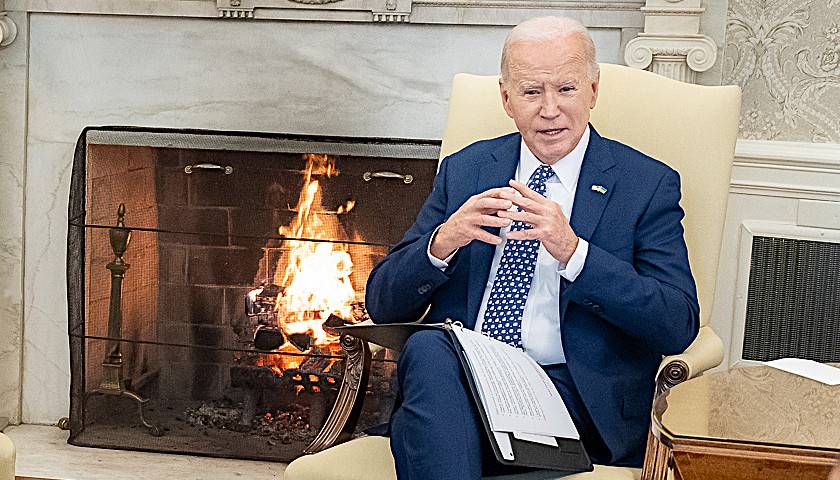by Jake Smith
President Joe Biden is quietly shifting strategy on the Israel-Hamas war amid a looming threat from activist groups and his voters ahead of the 2024 election.
For the first time since the war began on Oct. 7, the U.S. failed to veto a United Nations Security Council (UNSC) resolution calling for a six-week “immediate” ceasefire between Israel and Hamas, tied to the release of the hostages in Gaza. The Biden administration’s decision comes after pressure from his voting bloc, outcry from protestors and unrest in the White House.
“I had predicted shortly after the war that, despite President Biden’s overwhelming support for Israel at the time, he would cave to his extreme, pro-Hamas, anti-Israel base once Israel began to fight back after the October 7 atrocities,” Mark Dubowitz, CEO of Foundation for Defense of Democracies (FDD), a Washington, D.C.-based defense think tank, told the Daily Caller News Foundation. “The Israel Defense Forces (IDF) are fighting in one of the most dangerous and complicated urban environments in the history of warfare against an enemy whose entire strategy rests on maximizing the number of dead Palestinian and Israeli civilians.”
 ”Hamas has run one of the most successful disinformation campaigns by lying about the number of casualties and how many are terrorists versus civilians. President Biden has fallen for this, even quoting Hamas (Gaza casualty figure) numbers in his State of the Union,” Dubowitz told the DCNF. “In doing so, he has fallen into the political trap set by Hamas, their terror masters in Iran and their supporters in Michigan and other key states.”
”Hamas has run one of the most successful disinformation campaigns by lying about the number of casualties and how many are terrorists versus civilians. President Biden has fallen for this, even quoting Hamas (Gaza casualty figure) numbers in his State of the Union,” Dubowitz told the DCNF. “In doing so, he has fallen into the political trap set by Hamas, their terror masters in Iran and their supporters in Michigan and other key states.”
In the aftermath of the Hamas attacks against Israel on Oct. 7 — which killed over 1,200 civilians — the Biden administration backed Israel’s counteroffensive measures in the Gaza Strip. Initial calls for a ceasefire from pro-Palestinian advocates were met with rejection from the administration, which expressed concern it would only allow Hamas to regain its strength.
“The fact is that Israel, as they respond to these attacks, it seems to me that — have to continue to ensure that you have what you need to defend yourselves,” Biden told Israeli Prime Minister Benjamin Netanyahu during a trip to Tel Aviv, Israel on Oct. 18. “And we’re going to make sure that occurs.”
We will never fail to have Israel’s back. pic.twitter.com/3JM8d665iJ
— President Biden (@POTUS) October 8, 2023
“Any ceasefire would give Hamas the ability to rest, to refit, and to get ready to continue launching terrorist attacks against Israel,” State Department spokesman Matthew Miller told reporters during a press briefing on Oct. 23.
However, following pressure from activist groups, protestors and his own voting base, Biden began to change course. The Biden administration allowed the UNSC to pass the ceasefire resolution on Monday even after previously vetoing three similar resolutions.
“We came to the determination that this Security Council resolution… called for two things that we support: a ceasefire and the release of hostages together,” Miller told reporters on Mar. 26. “And so that’s why we abstained from the resolution. We do believe that it carries weight and should be implemented.”
Gabriel Noronha, executive director of Polaris National Security and former State Department official, told the DCNF that Biden could have stayed the course in its support for Israel’s war against Hamas, but the recent “political” decision by the administration only bolsters the terrorist group’s chances of survival because the U.S. is indicating it wants the conflict to stop.
“Biden is falling for what his own administration correctly identified as Hamas’ war strategy. And they’re playing completely into it,” Noronha told the DCNF. “These are not idiots in the White House. They know exactly what they’re doing. They’re cognizant that the policy choices they’re making will ensure Hamas’ survival and their ability to attack Israel again. They have just chosen to put political expediency above the national security of the United States or Israel, to try to increase their odds of reelection.”
The administration’s decision comes after months of pro-Palestinian demonstrations throughout the country, with protestors demanding Biden call on Israel to initiate a ceasefire in Gaza immediately. A series of protests — some of which turned violent — disrupted civilian life, shut down buildings and roadways, and in some cases propagated antisemitism and targeted Jewish individuals.
Shortly after the Oct. 7 attacks, Biden’s polling among the Democratic voting base fell sharply following his support for Israel. Hundreds of U.S. officials across dozens of administration agencies signed a letter addressed to Biden in November decrying his support for Israel and demanding he call for a ceasefire immediately.
Biden’s handling of the war continued to bleed his support going into January and February, especially among the Muslim and younger voting blocs. Democratic Michigan Rep. Rashida Tlaib, hailing from a state with a high Muslim population, encouraged voters not to support Biden in the state primaries amid his ongoing support for Israel, a call echoed by pro-Palestinian activist groups and leaders.
Over 100,000 individuals voted “uncommitted” rather than for Biden in the February Michigan primary. Biden is currently waning support in other battleground states, including Arizona, Georgia, Wisconsin, North Carolina and Pennsylvania, where former president and 2024 candidate Donald Trump is now leading among certain blocs.
BREAKING: 🇺🇲 US Vice President Kamala Harris says people in Gaza are starving and calls for immediate ceasefire as part of a deal to release hostages pic.twitter.com/d0vNp5yvhw
— Mega Geopolitics (@MegaGeopolitics) March 3, 2024
Internally, the Biden administration has reportedly become worried that the Israel-Hamas war is going to dominate the news cycle going into the 2024 elections in November. Biden has had several discussions with Netanyahu urging him to scale back operations and end the war quickly; discussions that often frustrated or confused Biden and in one case ended with him abruptly hanging up the phone on Netanyahu.
By the end of February, 56 percent of Democrats said they were less likely to vote for a candidate who supported military aid to Israel, according to a Reuters/Ipsos poll. The overwhelming majority of Democrats who participated in the poll said they wanted a candidate who would back a ceasefire in the Israel-Hamas war.
Echoing language recently used by some of his top officials, Biden called for a six-week “immediate ceasefire” in Gaza on Mar. 1 connected to the release of the hostages. Pro-Palestinian advocates celebrated the Biden administration’s decision to allow the UN ceasefire resolution to pass this week but demanded more concessions from Biden.
“This resolution is long overdue,” Amnesty International, a nongovernmental watchdog group, said in a statement on Monday. “For its part, the USA, which prior to this had vetoed three resolutions demanding an immediate ceasefire, should suspend arms transfers to Israel.”
“We thank the millions of activists who exerted pressure on the Biden administration over the months not to block the United Nations’ efforts to stop the genocide of the Palestinians,” the Council on American-Islamic Relations (CAIR), a Muslim advocacy group that has been criticized for praising Hamas and propagating antisemitism, said in a statement on Monday. “We need to keep up the pressure. It’s working.”
– – –
Jake Smith is a reporter at Daily Caller News Foundation.





